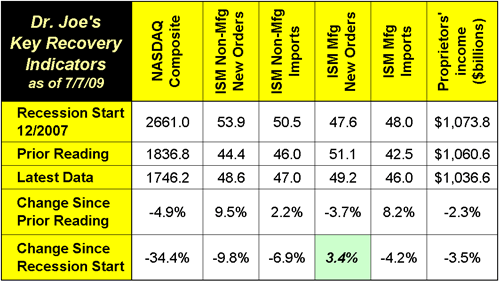Recovery is on the horizon, which always sounds good until you realize that the horizon is a fixed point in the sky and you are always the same distance away from it, whether you walk toward it or away from it. This month's recovery indicators certainly offer that futile feeling.
The ISM Manufacturing new orders index worsened since our last report, but it is still ahead of the levels it was at the start of the recession in December 2007. Proprietors' income, our measure of the conditions of small business, worsened, as it was revised down. The NASDAQ stock index got tired, very tired, dropping almost -5% in a month's time.
That's not to say we didn't get some improvement. The ISM Non-manufacturing new orders and imports indices improved, as did manufacturing imports. More importantly, not a single ISM measure is above 50. When it is below 50, it means that the index is contracting. So even though there were increases in some ISM indices, they only indicate that things are still declining, but at a slower rate.

At best, this is a mixed bag of indications, which is the kind of situation we would expect at a bottom, but I don't think we're there yet. Once we get a couple of the ISM indices above 50 while others are below, I'd be ready to call it as an economic bottom.
There are a few things that are quite disturbing in recent economic reports. The unemployment report of last Friday looked like a better than expected report in its first paragraph, but it seemed that as one read deeper and deeper, it got worse. The average work week is now only 33 hours, and that implies more job losses ahead. The number of discouraged and part time workers who want to work full time when added to the unemployment rate brings it up to almost 17%.
The ISM reports include a look at the prices manufacturers and service businesses are paying, and both reports showed inflation picking up, despite how slow things are.
Finally, there is starting to be some talk about an additional stimulus. Bush43 was barraged with complaints about how irresponsible the budget deficit was in his final years. If one believes in increased spending as stimulative, then those deficits should have created a booming economy by now. Though the current stimulus package has not all been used, enough of it has, as it is on top of a planned deficit that was already large. A second stimulus will only serve to seize the markets just like this current one has. Still, business owners are convinced of higher tax rates, which means that many investments and projects are abandoned because their after-tax returns are small and therefore risky, and that inflation will be considerably higher, rendering even the best after-tax returns worthless. The assumption that government borrowing will really only affect future generations is wrong. It affects markets now, because selling those obligations and announcing the plans to sell future obligations compete with dollars that would be used for business investment. Since business investment is risky, especially now, the effect on today's generations, not just tomorrow's, is a reality.
I have a whiny complaint as well. I have heard many analysts, and perhaps some government bureaucrats, discuss certain spending amounts as "rounding errors" in the grand scheme of things in relation to the size of the overall government budget. A billion dollars is being shrugged off as being nothing, but it's about the total federal income tax paid by 135,000 average households. And I thought the phrase "burn rate" when it was used by Internet companies was an insult to the hard work used to create the investment dollars that was entrusted to them. Money seems to have become meaningless, and it has become too easy to forget that individuals and families actually have to work to create them.









